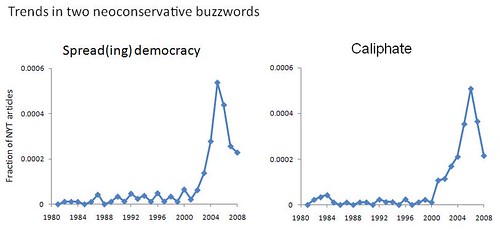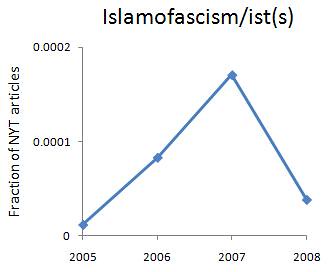|
Sunday, February 08, 2009
The decline, or at least shift in focus, of neoconservative foreign policy?
posted by
agnostic @ 2/08/2009 02:51:00 PM
On the topic of Razib's atonement for war-blogging, at my personal blog I showed a decline in the media's coverage of terrorism and of the individuals and groups involved in 9/11. How much broader does this pattern apply? Here I show similar rises and falls in the coverage of Iraq and Saudi Arabia, as well as other neoconservative ideals like spreading democracy.
First, media coverage of Iraq and Saudi Arabia from 1981 to 2008:  In the early-mid '80s, Saudi Arabia receives noticeably more coverage. Only in 1987 does Iraq take the lead. There are obvious spikes during the Gulf War and the recent occupation of Iraq, although the elites seem to care less and less about it, thank god. 2008 in particular saw a perceptible drop compared to the previous three years. Note that in the wake of 9/11, Saudi Arabia received hardly any coverage, while all the attention was on Iraq, which had nothing to do with it. Next, the changing prevalence in the national discourse of two neocon buzzwords:  These two graphs look very similar, and Spearman's rank correlation between the two is +0.69 (p two-tailed = 0.0004). This confirms that they're just two facets of a larger phenomenon, namely the rationalizations that supporters gave for invading Iraq, tracking down every last disgruntled Muslim, and so on. These peak in 2005 - 2006 and have sharply declined since, though they're still at post-9/11 levels. And just for yuks, here's a graph showing the rise and fall of the fad word "Islamofascism" and its variants:  Taken together with the data I presented on my personal blog about the declining coverage of terrorism in general, and of Bin Laden and related groups, this should give us hope. You figure that in about 5 years, our obsession with the worthless sandboxes of the world will have burned out of elite culture. Still, this doesn't mean we won't find some other hellhole to fight over, prolonging the 21st C. version of the risibly pointless Scramble for Africa. But it's somewhat promising that we might soon get back to focusing on the parts of the world that matter. |



